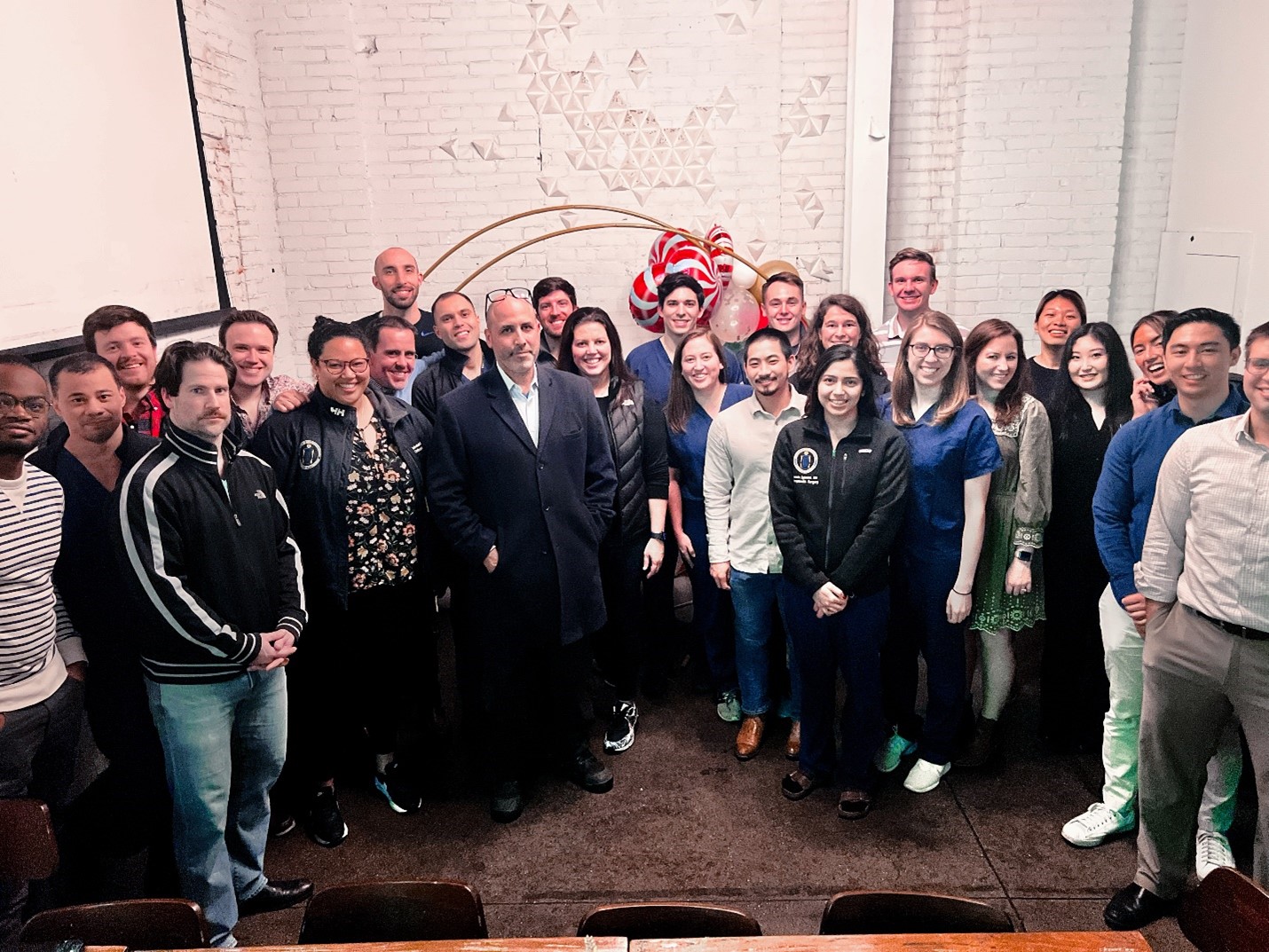Journal clubs that received JBJS funding support in October 2022 had much to say about their year of meetings. Here are a few updates from journal clubs at the University of Utah, the Icahn School of Medicine at Mount Sinai, and the University of Pittsburgh Medical Center.
The University of Utah
Dr. Matthew Philippi (PGY-5) and the ortho spine team, which includes both residents and fellows, recently had Dr. Christopher Kepler from Rothman speak at their journal club. Here’s what they had to say:
What studies did you cover in this journal club? Why were they chosen?
We had an assortment of studies covered, one of which was “Is High-Dose Tranexamic Safe in Spine Surgery? A Systematic Review and Meta-Analysis” by Akosman et al. These studies were included to help us understand current practice guidelines for DVT prophylaxis.
 What effect did Dr. Kepler’s virtual involvement have on the club’s experience?
What effect did Dr. Kepler’s virtual involvement have on the club’s experience?
Dr. Kepler’s involvement was great. He was able to share his institution’s experience with DVT prophylaxis and some preliminary data on postoperative complications based on the protocol at Rothman.
Was this the most engaging journal club meeting you’ve had this year and why? If no, what was and why?
This was the most engaging journal club of the year because we had Dr. Kepler share his institution’s experience, which led to a great discussion between him and Utah’s spine faculty. We have different protocols for DVT prophylaxis, which made for a great discussion.
What are some characteristics of a successful and enlightening journal club presentation?
Characteristics important to a lively journal club conversation include a controversial/unsolved subject with room for more research, a good meal and a beer, and opinionated attendings. I do think including Dr. Kepler (whom Dr. Spiker and Dr. Karamian have a close connection with after their fellowships at Rothman) was a great way to create some extra excitement about the journal club and increase attending engagement.
 How did your club benefit from the JBJS award and support?
How did your club benefit from the JBJS award and support?
It really served as a motivator for us to put together a great journal club. JBJS support not only allowed us to go to a nice restaurant, but I think having the event under the JBJS banner was a motivator to get all of the spine faculty to come out and participate.
Anything else you’d like to include?
Overall, I think that the JBJS journal club and the funding associated with it motivated us to have a great journal club with a visiting professor (via Zoom) that may even serve as a starting point for collaborative research regarding DVT prophylaxis in spine. I am greatly appreciative of the support and the opportunity to share ideas.
The Icahn School of Medicine at Mount Sinai
Dr. Harrison Ferlauto and the Icahn School of Medicine at Mount Sinai journal club met quarterly throughout this past year to discuss leading orthopaedic literature. Their goals were to grow resident knowledge in upper-extremity tumors and encourage residents to consider multiple fellowships in different subspecialties. They used their award funding to invite Dr. Ed Athanasian, for whom Dr. Ferlauto had a special gift…
“In April, we invited Dr. Ed Athanasian to join us for an upper-extremity, fresh tissue cadaver dissection and dinner/journal club, where we discussed upper-extremity tumor articles. The image is of me presenting Dr. Athanasian a thank-you gift of a framed image of Rembrandt’s “The Anatomy Lesson of Dr. Tulp.”
The University of Pittsburgh Medical Center
At the University of Pittsburgh Medical Center, Dr. Stephanie Boden and the journal club used their award to fund general and JBJS-specific meetings. When asked what their club goals and outcomes were, Dr. Boden had much to say:
- To promote evidence-based orthopaedics—successful; stimulated meaningful discussions and emphasized the importance of evidence-based orthopaedics
- To teach residents critical appraisal skills so they can effectively read and evaluate a scientific article—successful; had a journal club session that specifically focused on critical appraisal skills and effective evaluation of scientific articles. Also had different residents present articles at each event
- To promote a culture of participation and active learning in the journal club— successful; had different residents present articles at each event and fostered active discussion and learning
- To stay up-to-date with current literature—successful; used current articles to stay up-to-date with the current literature
-
 To foster resident-faculty relations and learning opportunities outside of the clinical setting—successful; had different attendings at each event, and the setting outside of the work environment helped foster relationships and increased learning opportunities
To foster resident-faculty relations and learning opportunities outside of the clinical setting—successful; had different attendings at each event, and the setting outside of the work environment helped foster relationships and increased learning opportunities - To enhance resident learning by inviting experienced orthopaedic journal editors to participate in the journal club and provide insight regarding the journal peer-review process—not successful; due to limited funding and scheduling availability, we did not end up getting an experienced journal editor to participate in journal club this year.”
Stay tuned for more information on the JBJS Robert Bucholz Resident Journal Club Support Program for the 2023-2024 academic year. Applications will be open this fall.
Interested in other OrthoBuzz content for residents and trainees? Check out the posts below from the new Resident Roundup section. Or if you have a good idea for a post, we’d like to hear from you. Find out more.




